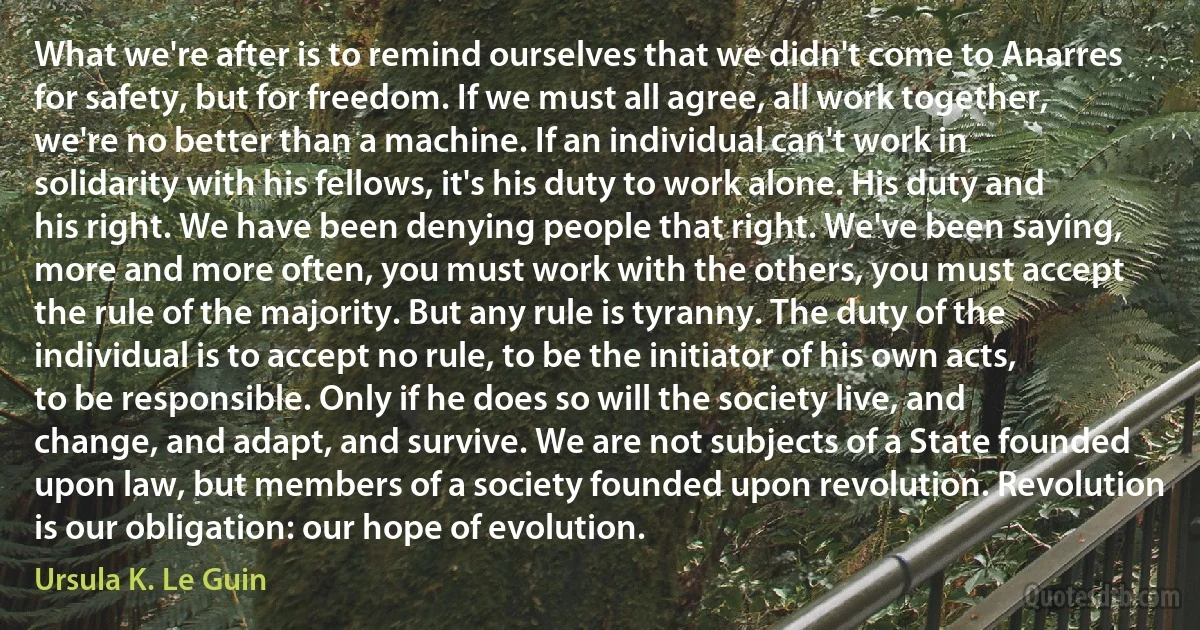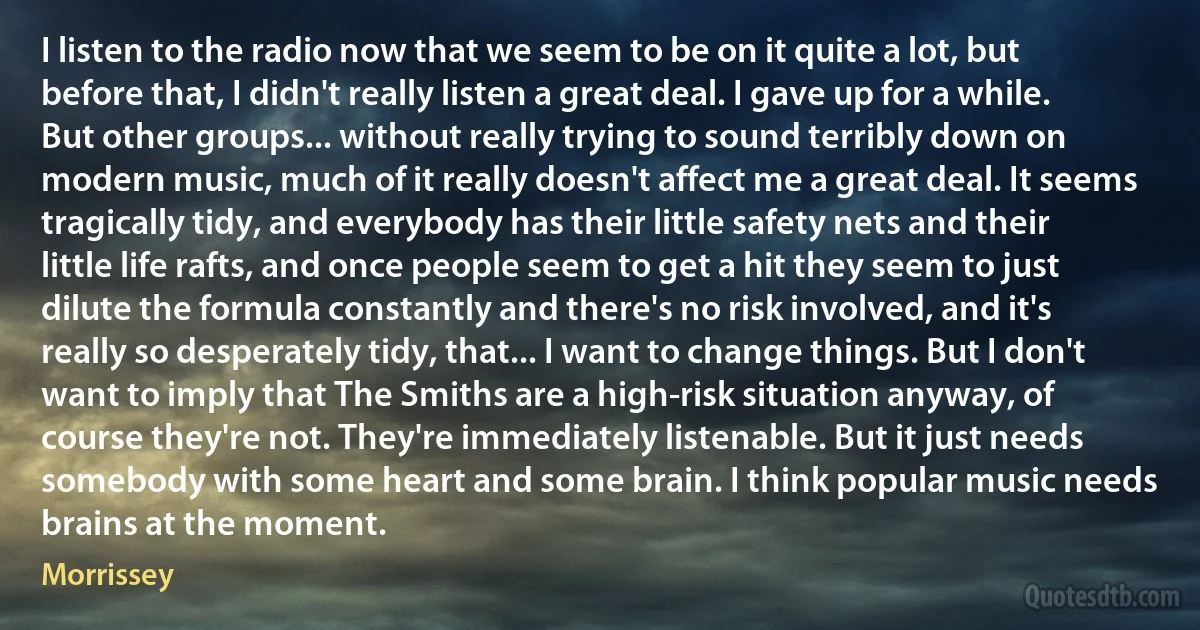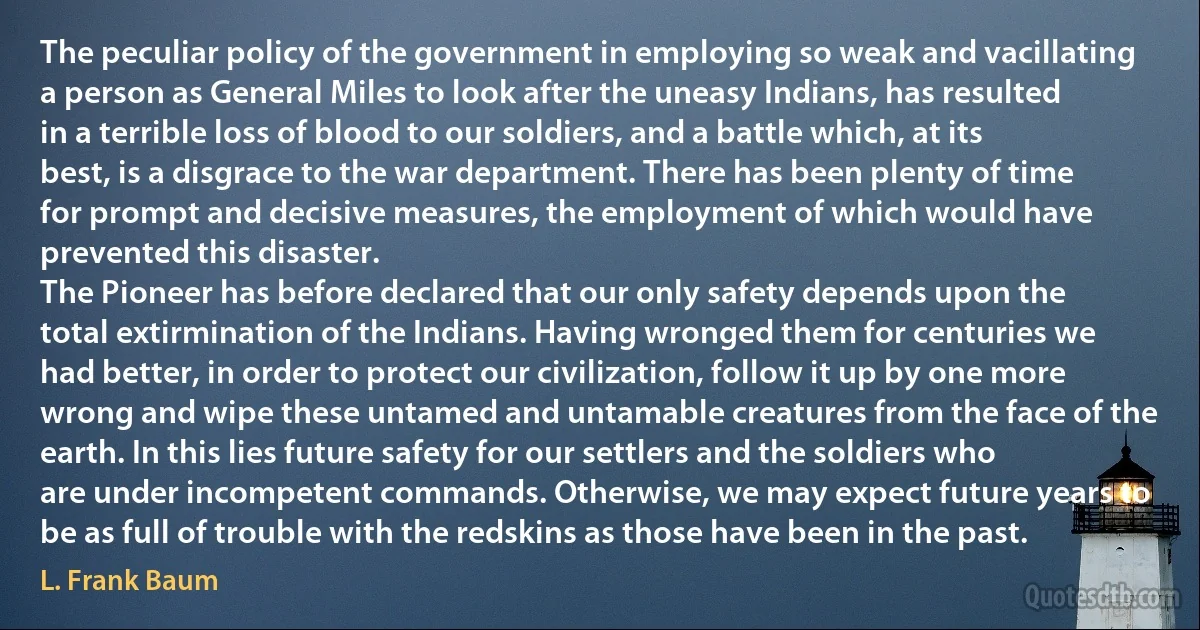Safety Quotes - page 11
When things don't change any longer, that's the end result of entropy, the heat-death of the universe. The more things go on moving, interrelating, conflicting, changing, the less balance there is-and the more life. I'm pro-life, George. Life itself is a huge gamble against the odds, against all odds! You can't try to live safely, there's no such thing as safety. Stick your neck out of your shell, then, and live fully! It's not how you get there, but where you get to that counts. What you're afraid to accept, here, is that we're engaged in a really great experiment, you and I. We're on the brink of discovering and controlling, for the good of all mankind, a whole new force, an entire new field of antientropic energy, of the life-force, of the will to act, to do, to change!

Ursula K. Le Guin
To secure order, freedom, and safety, for the minority as well as for the majority of the Irish people, and to do so as far as possible, by the administration of equal laws, should be the first object of any Ministry responsible for the government of that country. But I shall resist to the uttermost any attempt to loosen the connection, which has subsisted so long between Ireland and Great Britain, under whatever disguises that attempt may be made.

Arthur Balfour
Society, with all its prisons and bayonets and whips and ostracisms and starvations, is powerless in the face of the Anarchist who is prepared to sacrifice his own life in the battle with it. Our natural safety from the cheap and devastating explosives which every Russian student can make ... lies in the fact that brave and resolute men, when they are rascals, will not risk their skins for the good of humanity, and, when they are sympathetic enough to care for humanity, abhor murder, and never commit it until their consciences are outraged beyond endurance. The remedy is, then, simply not to outrage their consciences.

George Bernard Shaw
Our nation is shocked and saddened by the news of the shootings at Virginia Tech today...Schools should be places of safety, and sanctuary, and learning. When that sanctuary is violated, the impact is felt in every American classroom and every American community. Today our nation grieves with those who have lost loved ones at Virginia Tech. We hold the victims in our hearts; we lift them up in our prayers; and we ask a loving God to comfort those who are suffering today.

George W. Bush
It can be tempting to look at the challenges in Iraq and conclude our best option is to pack up and go home. That may be satisfying in the short run, but I believe the consequences for American security would be devastating. If American forces were to step back from Baghdad before it is more secure, a contagion of violence could spill out across the entire country. In time, this violence could engulf the region. The terrorists could emerge from the chaos with a safe haven in Iraq to replace the one they had in Afghanistan, which they used to plan the attacks of September the 11th, 2001. For the safety of the American people, we cannot allow this to happen.

George W. Bush
America and our friends and allies join with all those who want peace and security in the world and we stand together to win the war against terrorism. Tonight I ask for your prayers for all those who grieve, for the children whose worlds have been shattered, for all whose sense of safety and security has been threatened. And I pray they will be comforted by a power greater than any of us spoken through the ages in Psalm 23: Even though I walk through the valley of the shadow of death, I fear no evil, for You are with me.

George W. Bush
It would be difficult to describe the subtle brotherhood of men that was here established on the seas. No one said that it was so. No one mentioned it. But it dwelt in the boat, and each man felt it warm him. They were a captain, an oiler, a cook, and a correspondent, and they were friends, friends in a more curiously iron-bound degree than may be common. The hurt captain, lying against the water-jar in the bow, spoke always in a low voice and calmly, but he could never command a more ready and swiftly obedient crew than the motley three of the dingey. It was more than a mere recognition of what was best for the common safety. There was surely in it a quality that was personal and heartfelt. And after this devotion to the commander of the boat there was this comradeship that the correspondent, for instance, who had been taught to be cynical of men, knew even at the time was the best experience of his life. But no one said that it was so. No one mentioned it.

Stephen Crane
I know that the families of our military are praying that all those who serve will return safely and soon. Millions of Americans are praying with you for the safety of your loved ones and for the protection of the innocent. For your sacrifice, you have the gratitude and respect of the American people. And you can know that our forces will be coming home as soon as their work is done.

George W. Bush
With my own eyes I saw Spaniards cut off the nose and ears of Indians, male and female, without provocation, merely because it pleased them to do it. ...Likewise, I saw how they summoned the caciques and the chief rulers to come, assuring them safety, and when they peacefully came, they were taken captive and burned.

Bartolomé de las Casas
Who do you think spies are: priests, saints and martyrs? They're a squalid procession of vain fools, traitors, too, yes; pansies, sadists and drunkards, people who play cowboys and Indians to brighten their rotten lives. Do you think they sit like monks in London balancing the rights and wrongs? I'd have killed Mundt if I could, I hate his guts; but not now. It so happens they need him. They need him so that the great moronic mass that you admire can sleep soundly in their beds at night. They need him for the safety of ordinary, crummy people like you and me.

John le Carré
I literally remember when I made my audition tape for 'Buffy'. I went to the Arsenal Mall. I got my outfit at Contempo Casuals in the Arsenal Mall and put some safety pins in my jeans. I remember telling whoever the clerk was that I was making a tape for 'Buffy', and they were so excited.

Eliza Dushku
Without in any way minimising the economic and psychological blow that people experience when they lose their jobs, the unemployed in affluent countries still have a safety net, in the form of social security payments, and usually free healthcare and free education for their children. They also have sanitation and safe drinking water.

Peter Singer



